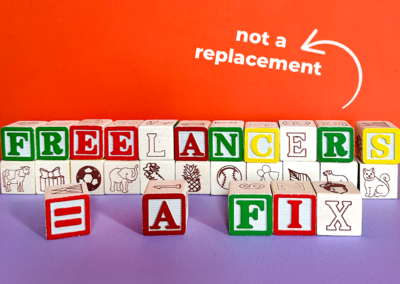Traditionally, autistic adults experience struggles with attaining and retaining employment. In 2015, the A. J. Drexel Autism Institute found that only 58 percent of young adults had any employment between high school years to age 25. Of those employed, 70 percent of young autistic adults disclosed to their employers, but only 39 percent received any accommodations. And amongst autistic adults aged 18 and over, only 16 percent have full-time jobs. Yet it is estimated that 1 in 45 U.S. adults are autistic.
One of the biggest challenges that autistic people face is simply disclosing their condition to employers. While the Americans with Disabilities Act (ADA) offers protections and rights for disabled workers, there can be fear of disclosing. During the interviewing process, a person may remain silent for fear of being denied a position. Later on, a person may not disclose for fear of stigma and social eschewing.
Autism is invisible to some extent, and many people have urged me to not disclose. Doing so would be self-sabotage, they say. Yet I have faced numerous social difficulties in previous jobs, which could have been mitigated if only I had disclosed. Or if only I knew I had autism in the first place. When previously undiagnosed, my social awkwardness had no explanation, and I directed a lot of hate towards myself for it. By having a diagnosis now, I intend to disclose to potential employers as a way to protect myself. If a job refuses to hire me because I am autistic, that is probably a place where I don’t want to work anyway.
To combat social stigmas and further gatekeeping from the autistic community, moderated conversations are a great starting point. Autistic people should be able to share their neurodivergent facets, and how these are valid expressions of the self. Such aspects include:
- Not perceiving nonverbal communication cues
- Hyperfocusing
- The need for solitude
- The dangers of masking, forcing a person to hide their behaviors
- The experience of sensory overload: becoming overwhelmed and frazzled by loud noises or too much sensory stimuli
- The need for stimming: repetitive soothing behaviors such as hand flapping or rocking
- Lack of eye contact, and how it is benign, not malicious
- The need for routine and predictable schedules
Although these differences may be perceived as weaknesses, they should be reframed as neutral experiences. It must be emphasized further that the above traits should not solidify into “stereotypes.” Even with the above list, not all autistic people display all these traits. I myself am highly social, although I express it in a sometimes-off-putting way. I speak loudly and rapidly, and sometimes I make a squeaking voice when I am happy.
When neutralizing autistic behaviors, the positives of autism can really come to the surface, allowing a person to shine. Personally, when I am permitted to act in a natural way, I am happier and more motivated to work my best. I think more quickly and can produce work faster. I also feel more appreciated by coworkers. Ultimately, an autistic person should feel comfortable and welcome in the workplace, so that they can feel supported and do their best work, however that manifests for the person individually.
The advent of remote work during the COVID-19 pandemic may be a boon in disguise. It’s comfortable to work at home, sitting in a safe and familiar environment, not having to worry about judgment from coworkers merely for being yourself. There is no need to schmooze, and you can focus on creating a good product. This can be an ideal work environment for autistic folks. Yet even with remote work, there is still the difficulty of corresponding with coworkers or not picking up nonverbal hints. Ultimately, workplaces must emphasize acceptance.
I’ll share my own experience to illustrate the experience of being an autistic person navigating the workplace. My challenges seem fundamentally rooted in my difficulty with reading body language. While nonverbal communication is vital to many, I cannot perceive it. It’s difficult for me to make “small talk,” which is considered the norm for cultivating a “team” dynamic amongst coworkers. I also prefer being alone. I’ve been known to skip office parties and work the whole time through.
I compensate for social uneasiness by focusing on doing my work well. This is both my personal preference, and also how I naturally roll. When I do tasks, I “hyperfocus,” getting engrossed in assignments for hours at a time, creating a quality product while in complete isolation.
Yet at many jobs, this is not enough. In sales and customer service, there is an unspoken expectation to sound overly friendly. When I tried a couple jobs of this nature, my manner was described as abrasive and unfriendly. This feedback confused me, because I didn’t feel like I was being such. Back then, I didn’t know I was autistic, so I interpreted the feedback as indicating that there was something fundamentally wrong with me as a person.
Interviews have been difficult at times given nonverbal connection with the interviewer poses a challenge, so I compensate by expressing energetic and positive enthusiasm, talking about my passion for working and highlighting my strengths. However, there have been times that I’ve expressed enthusiasm without fully addressing my expertise in the job responsibilities as written in the job description.
This is rooted in my need to be genuine, in whatever work I do. One positive trait that autistic people bear is that we are fundamentally honest people. For me, I have to be excited about whatever work I do, otherwise I am forced to “mask.” Masking occurs when an autistic person makes efforts to camouflage their autistic behaviors and adopt those of the neurotypical people around them. Masking is very unhealthy, and can lead to fatigue and burnout. It also makes me frustrated, because I get resentful that I can’t be myself the way other people can.
Again, I’ve circumvented these challenges by harnessing my special interests. I played the viola as a child, and that skill and passion got me through college. These days as a writer, I have a body of written work to show employers. Writing has also taught me to verbally communicate in a way that is appealing to others. It nets me jobs these days, but things can get socially complicated later on.
Most recently, I was hired as a marketing writer to create content for websites. It felt great because I got to work from home. I completed assignments enthusiastically and asked coworkers lots of questions (via online chats). I’ve learned that asking questions helps to reveal vital nonverbal implications that I would otherwise miss out on. Coworkers politely answered my questions.
I felt puzzled when I was fired after only thirty days. I was told that I asked too many questions, and my writing did not fit their marketing style. Only after this news was deliberated did I have faint recollections of hinting conversations. Hints I hadn’t picked up on earlier.
“We’d prefer if you focus on writing, not research.”
“You have to write in a more user-friendly way, not so academic.”
“Slow down in your work, make sure it’s accurate.”
It helps me to not feel resentful over these miscommunications. I didn’t disclose my autism at this job, so they could not have made adjustments for me. Also, I can learn from this past experience to determine a work environment that is more suited for me.
Overall, it is most important for employers to realize that autistic people are not impaired. We are different, not less than. We are also different from one another. It’s important not to generalize autistic people as assumptions cannot be made about our intelligence, capacities and limitations. To learn such, it is imperative to want to learn about each person individually, the way you would approach any other person. With dignity, and respect.
Neesa’s Socials: LinkedIn



